tesol(国际英语教师资格证结业作文)
教资英语作文
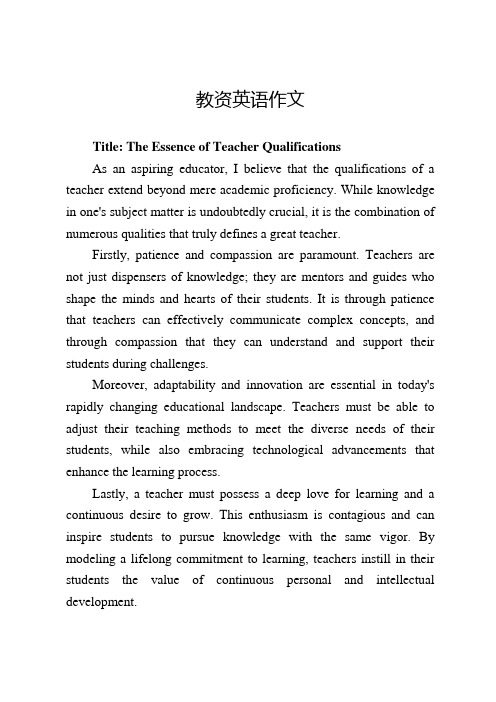
教资英语作文Title: The Essence of Teacher QualificationsAs an aspiring educator, I believe that the qualifications of a teacher extend beyond mere academic proficiency. While knowledge in one's subject matter is undoubtedly crucial, it is the combination of numerous qualities that truly defines a great teacher.Firstly, patience and compassion are paramount. Teachers are not just dispensers of knowledge; they are mentors and guides who shape the minds and hearts of their students. It is through patience that teachers can effectively communicate complex concepts, and through compassion that they can understand and support their students during challenges.Moreover, adaptability and innovation are essential in today's rapidly changing educational landscape. Teachers must be able to adjust their teaching methods to meet the diverse needs of their students, while also embracing technological advancements that enhance the learning process.Lastly, a teacher must possess a deep love for learning and a continuous desire to grow. This enthusiasm is contagious and can inspire students to pursue knowledge with the same vigor. By modeling a lifelong commitment to learning, teachers instill in their students the value of continuous personal and intellectual development.In conclusion, the qualifications of a teacher are multifaceted, encompassing not only academic knowledge but also interpersonal skills, adaptability, and a passion for learning. It is this comprehensive set of qualifications that allows teachers to fulfill their noble mission of nurturing the next generation of thinkers and leaders.标题:教师资质的精髓作为一名有抱负的教育工作者,我认为教师的资质不仅仅在于学术上的精通。
世界英语教师协会tesol证书
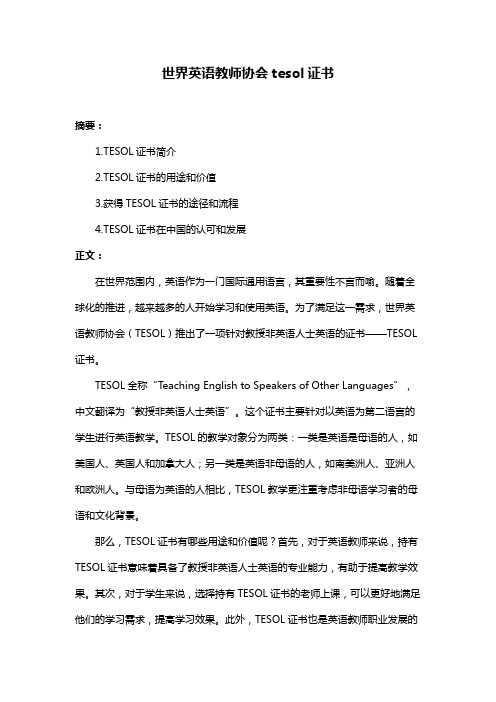
世界英语教师协会tesol证书摘要:1.TESOL证书简介2.TESOL证书的用途和价值3.获得TESOL证书的途径和流程4.TESOL证书在中国的认可和发展正文:在世界范围内,英语作为一门国际通用语言,其重要性不言而喻。
随着全球化的推进,越来越多的人开始学习和使用英语。
为了满足这一需求,世界英语教师协会(TESOL)推出了一项针对教授非英语人士英语的证书——TESOL 证书。
TESOL全称“Teaching English to Speakers of Other Languages”,中文翻译为“教授非英语人士英语”。
这个证书主要针对以英语为第二语言的学生进行英语教学。
TESOL的教学对象分为两类:一类是英语是母语的人,如美国人、英国人和加拿大人;另一类是英语非母语的人,如南美洲人、亚洲人和欧洲人。
与母语为英语的人相比,TESOL教学更注重考虑非母语学习者的母语和文化背景。
那么,TESOL证书有哪些用途和价值呢?首先,对于英语教师来说,持有TESOL证书意味着具备了教授非英语人士英语的专业能力,有助于提高教学效果。
其次,对于学生来说,选择持有TESOL证书的老师上课,可以更好地满足他们的学习需求,提高学习效果。
此外,TESOL证书也是英语教师职业发展的重要依据,有助于提升个人综合素质和市场竞争力。
在我国,TESOL证书越来越受到重视。
许多知名学校和教育机构都将TESOL证书作为招聘英语教师的重要标准。
为了帮助更多人获得TESOL证书,我国引进了在线网络学习课程,让学员足不出户就能学习到专业的英语教学知识。
此外,还有一些学校如大连外国语大学,提供了TESOL助学金,鼓励更多人参与到英语教育事业中来。
获得TESOL证书的途径和流程相对简单。
首先,学员需要注册并缴费,然后登录学习中心开始学习。
整个课程共有20个单元,学习完一个单元并完成该单元的测试后,方可进入下一个单元。
学习结束后,学员需要参加线下考试,通过考试即可获得TESOL证书。
tesol个人陈述模版
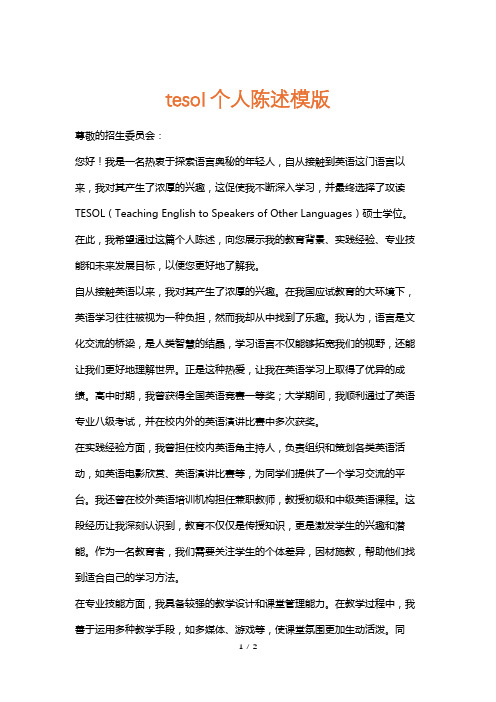
tesol个人陈述模版尊敬的招生委员会:您好!我是一名热衷于探索语言奥秘的年轻人,自从接触到英语这门语言以来,我对其产生了浓厚的兴趣,这促使我不断深入学习,并最终选择了攻读TESOL(Teaching English to Speakers of Other Languages)硕士学位。
在此,我希望通过这篇个人陈述,向您展示我的教育背景、实践经验、专业技能和未来发展目标,以便您更好地了解我。
自从接触英语以来,我对其产生了浓厚的兴趣。
在我国应试教育的大环境下,英语学习往往被视为一种负担,然而我却从中找到了乐趣。
我认为,语言是文化交流的桥梁,是人类智慧的结晶,学习语言不仅能够拓宽我们的视野,还能让我们更好地理解世界。
正是这种热爱,让我在英语学习上取得了优异的成绩。
高中时期,我曾获得全国英语竞赛一等奖;大学期间,我顺利通过了英语专业八级考试,并在校内外的英语演讲比赛中多次获奖。
在实践经验方面,我曾担任校内英语角主持人,负责组织和策划各类英语活动,如英语电影欣赏、英语演讲比赛等,为同学们提供了一个学习交流的平台。
我还曾在校外英语培训机构担任兼职教师,教授初级和中级英语课程。
这段经历让我深刻认识到,教育不仅仅是传授知识,更是激发学生的兴趣和潜能。
作为一名教育者,我们需要关注学生的个体差异,因材施教,帮助他们找到适合自己的学习方法。
在专业技能方面,我具备较强的教学设计和课堂管理能力。
在教学过程中,我善于运用多种教学手段,如多媒体、游戏等,使课堂氛围更加生动活泼。
同时,我也注重培养学生的口语表达能力,鼓励他们积极参与课堂讨论。
在课堂管理方面,我善于与学生建立良好的师生关系,尊重他们的意见和建议,营造一个和谐、民主的学习环境。
我还具备丰富的国际交流经验。
大学期间,我曾参加为期一个学期的国际交流项目,赴美国一所知名大学学习。
在那里,我结识了来自世界各地的同学,与他们共同生活和学习,深入了解了不同文化背景下的教育理念和教学方法。
TESOL(精选5篇)
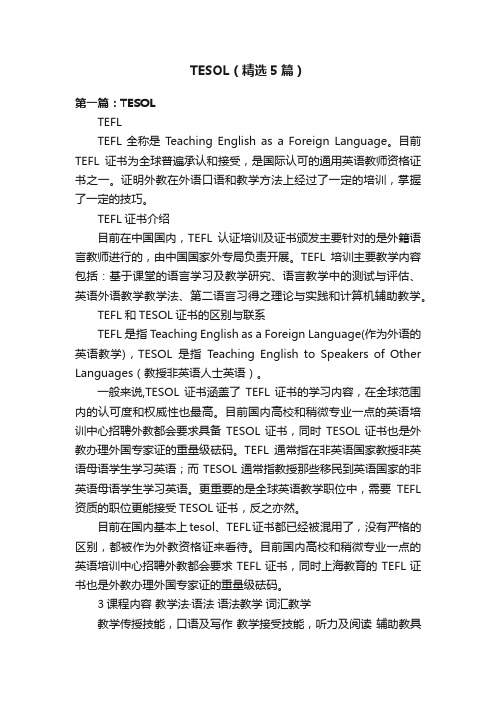
TESOL(精选5篇)第一篇:TESOLTEFLTEFL全称是Teaching English as a Foreign Language。
目前TEFL证书为全球普遍承认和接受,是国际认可的通用英语教师资格证书之一。
证明外教在外语口语和教学方法上经过了一定的培训,掌握了一定的技巧。
TEFL证书介绍目前在中国国内,TEFL认证培训及证书颁发主要针对的是外籍语言教师进行的,由中国国家外专局负责开展。
TEFL培训主要教学内容包括:基于课堂的语言学习及教学研究、语言教学中的测试与评估、英语外语教学教学法、第二语言习得之理论与实践和计算机辅助教学。
TEFL和TESOL证书的区别与联系TEFL是指Teaching English as a Foreign Language(作为外语的英语教学),TESOL是指T eaching English to Speakers of Other Languages(教授非英语人士英语)。
一般来说,TESOL证书涵盖了TEFL证书的学习内容,在全球范围内的认可度和权威性也最高。
目前国内高校和稍微专业一点的英语培训中心招聘外教都会要求具备TESOL证书,同时TESOL证书也是外教办理外国专家证的重量级砝码。
TEFL通常指在非英语国家教授非英语母语学生学习英语;而TESOL通常指教授那些移民到英语国家的非英语母语学生学习英语。
更重要的是全球英语教学职位中,需要TEFL 资质的职位更能接受TESOL证书,反之亦然。
目前在国内基本上tesol、TEFL证书都已经被混用了,没有严格的区别,都被作为外教资格证来看待。
目前国内高校和稍微专业一点的英语培训中心招聘外教都会要求TEFL证书,同时上海教育的TEFL证书也是外教办理外国专家证的重量级砝码。
3课程内容教学法·语法语法教学词汇教学教学传授技能,口语及写作教学接受技能,听力及阅读辅助教具及方法语音教学课程计划年轻学员及少年儿童教学法教材有效运用TESOLTESOL是“Teaching English to Speakers of Other Languages” 的缩写,中文翻译是“对外英语教学”。
2024年教师资格证考试综合素质英语作文
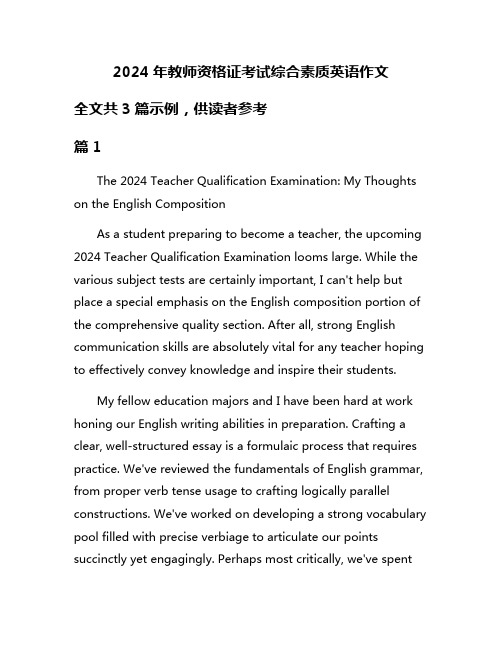
2024年教师资格证考试综合素质英语作文全文共3篇示例,供读者参考篇1The 2024 Teacher Qualification Examination: My Thoughts on the English CompositionAs a student preparing to become a teacher, the upcoming 2024 Teacher Qualification Examination looms large. While the various subject tests are certainly important, I can't help but place a special emphasis on the English composition portion of the comprehensive quality section. After all, strong English communication skills are absolutely vital for any teacher hoping to effectively convey knowledge and inspire their students.My fellow education majors and I have been hard at work honing our English writing abilities in preparation. Crafting a clear, well-structured essay is a formulaic process that requires practice. We've reviewed the fundamentals of English grammar, from proper verb tense usage to crafting logically parallel constructions. We've worked on developing a strong vocabulary pool filled with precise verbiage to articulate our points succinctly yet engagingly. Perhaps most critically, we've spentmany hours practicing coherent organization, ensuring our essays follow a logical flow with unified paragraphs building towards a clear thesis.However, the English composition isn't merely an exercise in technicalities. Equally important is the ability to think critically and form substantive insights into the provided prompt. The examiners won't be looking for regurgitated facts, but rather our own unique perspectives developed through careful analysis. This requires reading the prompt from multiple angles, identifying key points and implications, forming our own evaluations, and backing them up with relevant examples and evidence. It's a balance of crisp writing and deeper contemplation.Considering the prompt could cover any number of educational topics, we've tried to prepare by studying a wide range of issues facing the modern classroom. Topics like the role of technology in learning, strategies for an inclusive environment, Character development approaches, and embedding critical thinking skills have all been fodder for practice essays. Analyzing these subjects from all sides has helped sharpen our communication abilities while expanding our insight into core teaching philosophies we'll need to embody as future educators.On a more personal level, I've tried to approach each practice essay as an opportunity for self-reflection on the type of teacher I aspire to become. What principals and values will guide my instruction? How can I create an engaging environment that unlocks every student's potential? What understandings or paradigm shifts might I hope to impart through my lessons? Grappling with these profound questions has helped solidify my motivation to join this noblest of professions. I don't simply want to teach facts and knowledge, but to nurture curious, passionate minds.That driving purpose is what I hope will elevate my English composition on examination day. While technical writing skills are essential, it's that deeper level of personal insight, innovative thinking, and philosophical grounding that I believe will truly set my response apart. I want my words to inspire the examiner, showcasing the care and responsibility I'll bring to my future classroom. With the right mindset and a whole lot of practice, I'm confident I can channel my passion for teaching into a compelling argument that passes this key milestone.Of course, there's an inherent challenge in articulating the full depth and nuance of my perspectives constrained by an examination time limit. Trying to wrangle complex concepts andambitious goals into a cohesive essay in a mere few hours is no easy feat. It will require distilling my thoughts to their very essence, assiduously structuring my arguments, and gilding them with the crispest language possible. However, overcoming that intense time pressure is in many ways simply preparation for the multi-tasking mindset of orchestrating a dynamic classroom environment. If I can organize my thinking and communicate clearly under such constraints, it will be valuable training for my future career.In the end, while the English composition may seem like just one small portion of a arduous examination process, I've come to regard it as perhaps the most revealing and meaningful component. It's my opportunity to demonstrate not just my technical competency with the language, but the full breadth of my critical thinking capabilities and passion for the vocation of teaching itself. This is my chance to argue why I'm truly ready to lead the classrooms of tomorrow and impact young lives in a positive way.With unwavering dedication and effort, I've done everything in my power to prepare for this critical task. Now, I eagerly await the examination day, ready to pour my heart into crafting an English composition that does justice to the nobility of theteaching profession. Success or not, I know this experience will only further fuel my drive to become the best educator I can possibly be. After all, that's what this pivotal career is all about - continual learning, growth, and striving to inspire the same limitless potential in generations of students to come.篇2The Importance of Adaptability in the Teaching ProfessionAs students, we have encountered countless teachers throughout our academic journeys, each with their unique styles, approaches, and personalities. However, the exceptional ones stand out for their ability to adapt to diverse situations and cater to the needs of their students. In today's rapidly evolving educational landscape, adaptability has become an indispensable trait for teachers, enabling them to navigate the complexities of the classroom and foster a conducive learning environment.One of the primary reasons why adaptability is crucial in the teaching profession is the inherent diversity within classrooms. Students come from various backgrounds, with different learning styles, abilities, and cultural contexts. A one-size-fits-all approach is no longer viable, as it fails to address the individualneeds of each learner. Adaptable teachers possess the flexibility to tailor their teaching methods, materials, and assessments to accommodate this diversity, ensuring that every student has an equal opportunity to thrive.Moreover, the advent of technology has profoundly impacted the educational sector, introducing new tools, platforms, and modes of delivery. Embracing technological advancements is essential for teachers, as it not only enhances the learning experience but also prepares students for the digital world they will encounter beyond the classroom walls. Adaptable teachers are willing to continually learn and integrate new technologies, leveraging their potential to engage students and foster interactive and immersive learning experiences.Adaptability also plays a pivotal role in addressing unforeseen challenges and disruptions that may arise in the classroom or the broader educational system. Whether it is dealing with sudden policy changes, unexpected student behaviors, or even natural disasters, adaptable teachers can swiftly adjust their plans and strategies to minimize disruptions and maintain continuity in the learning process. Their ability to think critically and creatively in the face of adversity ensures that students' educational progress is not compromised.Furthermore, the teaching profession demands constant professional development and growth. As the body of knowledge expands and pedagogical approaches evolve, teachers must be willing to adapt and update their skills and knowledge. Adaptable teachers embrace lifelong learning, engaging in continuous professional development opportunities, such as workshops, conferences, or online courses. This commitment to personal growth not only enhances their effectiveness but also serves as a model for students, inspiring them to embrace the pursuit of knowledge throughout their lives.In addition to adapting to external factors, adaptable teachers also demonstrate the ability to adjust their teaching methods based on real-time feedback and observations within the classroom setting. By actively listening to their students, monitoring their progress, and reflecting on their own practices, these teachers can identify areas for improvement and make necessary modifications. This responsiveness to student needs and the willingness to adapt their approaches fosters a dynamic and engaging learning environment, where students feel valued and supported.Undoubtedly, adaptability is a multifaceted skill that encompasses various aspects of the teaching profession. It involves the ability to empathize with students, understand their diverse backgrounds and learning needs, and tailor instructional strategies accordingly. Adaptable teachers are open-minded, embracing different perspectives and cultural nuances, fostering an inclusive and respectful classroom environment.Moreover, adaptability requires effective communication skills, as teachers must clearly articulate their expectations, provide constructive feedback, and facilitate open dialogues with students, parents, and colleagues. By actively listening and engaging in collaborative problem-solving, adaptable teachers can navigate challenges more effectively and cultivate a supportive learning community.Ultimately, adaptability is a cornerstone of effective teaching, enabling educators to navigate the complexities of the modern educational landscape and create an environment where every student can thrive. As students, we appreciate and value teachers who possess this invaluable trait, as they not only impart knowledge but also shape our resilience, creativity, and ability to embrace change.In conclusion, the teaching profession demands a high degree of adaptability, as itencompasses the ability to cater to diverse student needs, integrate technological advancements, overcome challenges, engage in continuous professional development, and foster an inclusive and supportive learning environment. By cultivating adaptability, teachers can effectively navigate the ever-changing educational landscape and inspire their students to become lifelong learners, equipped with the skills and mindset necessary to succeed in an increasingly dynamic world.篇3The 2024 Teacher Qualification Examination: My Hopes for the Future of EducationAs a student preparing to take the 2024 Teacher Qualification Examination, I can't help but feel a mixture of excitement and trepidation. This exam represents not just a hurdle to overcome, but a crossroads at which I must choose the path I will take into the future of education. The world is changing rapidly, and the role of teachers is evolving alongside it. It is my sincere hope that by earning my teaching credentials, I can play a part in shaping an educational system that isresponsive, inclusive, and geared towards unlocking the full potential of every student.Perhaps one of the greatest challenges facing educators today is how to engage and inspire students in a world of constant digital distraction. Social media, video games, and the endless well of online content compete incessantly for young minds. As a teacher, I will need to find ways to cut through the noise and reignite that innate sense of curiosity that all children are born with. This will require evolving our pedagogical methods, incorporating more multimedia and interactive elements into lessons to cater to diverse learning styles.However, innovation in education must go beyond just making classes more entertaining. We have a responsibility to prepare students for a future where technological disruption will be the norm, where job markets will be in constant flux, and where adaptability and creative problem-solving will be paramount. A heavy emphasis on rote memorization and standardized testing is ill-suited for this reality. Instead, we should be fostering critical thinking skills, encouraging students to question assumptions, and providing opportunities for interdisciplinary learning that mimics the cross-pollination of ideas in the real world.Equally crucial is instilling in our students a sense of social and environmental consciousness. The challenges we face as a global community, from climate change to rising inequality, demand a generation of ethically-grounded citizens capable of enacting positive change. Education should not be limited to academic subjects, but should also nurture empathy, emotional intelligence, and a commitment to sustainable living. By embedding these values into the curriculum, we can empower students to be agents of progress, not merely passive recipients of knowledge.Of course, no discussion of the future of education would be complete without addressing issues of equity and inclusion. For too long, our educational system has perpetuated systemic inequalities, creating barriers for marginalized groups and depriving society of vast reservoirs of untapped talent. As an educator, I am committed to creating an environment where every student feels welcomed, respected, and given the tools to succeed regardless of their background or circumstances.This means actively combating implicit biases, both within ourselves and within the educational materials we use. It means embracing culturally responsive teaching practices that validate and incorporate the diverse experiences and perspectives of ourstudents. It means fostering a classroom culture of mutual understanding and respect, where differences are celebrated rather than diminished. Only by leveling the playing field can we truly unlock the full potential of all learners.Underpinning all of these aspirations is a fundamental belief in the transformative power of education. A quality education is not just a means to an end, but an end in itself – a force that can uplift individuals, communities, and entire societies. It is the great equalizer, the engine of social mobility, and the key to unlocking a more just, prosperous, and sustainable future for all.As I approach the 2024 Teacher Qualification Examination, I am acutely aware of the gravity of the responsibility I am taking on. To be an educator is to be a shaper of minds, a cultivator of potential, and a steward of the next generation's hopes and dreams. It is a role that demands not just subject mastery, but empathy, patience, and an unwavering commitment to the growth and well-being of every student.Yet for all the challenges that lie ahead, I am emboldened by the knowledge that I am part of a noble tradition – a lineage of dedicated individuals who have devoted their lives to the cause of enlightenment and human progress. It is a mantle I will wearwith pride, and a calling I will pursue with every ounce of my passion and determination.For in the end, education is not just about imparting knowledge – it is about igniting the spark of curiosity, instilling a love of learning, and equipping young minds with the tools to navigate an ever-changing world. It is about nurturing the leaders, innovators, and problem-solvers of tomorrow. And it is about creating a more just, equitable, and sustainable future for all.As I stand on the precipice of this new chapter, I am filled with a sense of hope and possibility. The road ahead will be long and challenging, but the rewards – the privilege of shaping young lives and contributing to the greater good – will make every step worthwhile. With an open mind, a compassionate heart, and an unwavering commitment to excellence, I am ready to embrace the future of education and all that it has to offer.。
国际英语教师资格证 少儿证书作业参考答案TESOL for Children Assignment
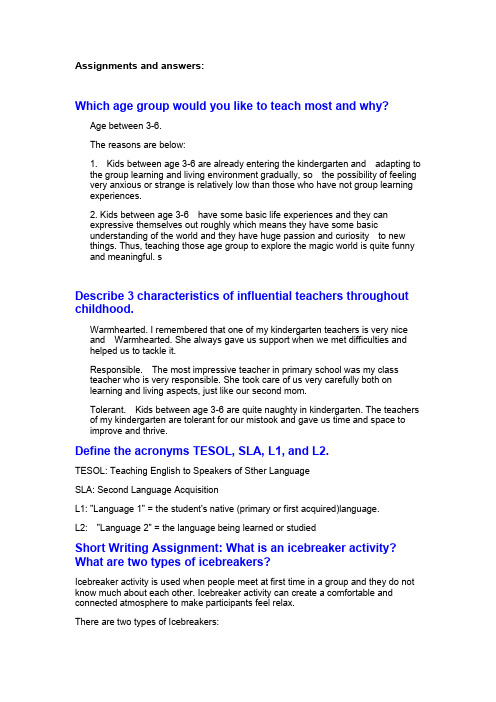
1. Facilitating Introductions: Are used to help participants ease into training and helps the participants to learn each other’s names and information (Dover, 2004). The introduction icebreakers are best used on first days of school when trying to learn student’s names and a little bit about them.
Define the acronyms TESOL, SLA, L1, and L2.
TESOL: Teaching English to Speakers of Sther Language
SLA: Second Language Acquisition
L1: "Language 1" = the student's native (primary or first acquired)language.
Assignments and answers:
Which age group would you like to teach most and why?
Age between 3-6.
The reasons are below:
1. Kids between age 3-6 are already entering the kindergarten and adapting to the group learning and living environment gradually, so the possibility of feeling very anxious or strange is relatively low than those who have not group learning experiences.
教师资格证好坏处英文作文

教师资格证好坏处英文作文Pros and Cons of the Teaching CertificationTeaching has long been considered a noble profession, one that plays a crucial role in shaping the minds and futures of the next generation. The teaching certification, a standardized qualification required for individuals to teach in many educational systems, has been a topic of much debate and discussion. While some argue that the certification ensures a certain level of competence and professionalism, others contend that it may not be the best indicator of an individual's ability to effectively educate students. In this essay, we will explore the pros and cons of the teaching certification, considering its impact on both the teaching profession and the educational landscape as a whole.One of the primary advantages of the teaching certification is the assurance of a certain level of knowledge and skill. The certification process typically involves a comprehensive evaluation of an individual's academic background, pedagogical understanding, and practical teaching abilities. This ensures that certified teachers have a solid foundation in their subject matter and the necessary tools to deliver effective instruction. Proponents of the certification arguethat this standardization raises the overall quality of teaching, as it weeds out those who may not possess the requisite knowledge or teaching aptitude.Moreover, the teaching certification serves as a form of professional recognition and validation. It demonstrates that an individual has met the rigorous standards set forth by the educational authorities, thereby enhancing their credibility and earning the trust of students, parents, and the community. This can be particularly important in a field where public perception and confidence in the teaching profession are crucial. The certification can also open doors to better employment opportunities and career advancement, as many school districts and educational institutions prioritize hiring certified teachers.However, critics of the teaching certification argue that it does not necessarily translate to effective teaching in the classroom. They assert that the certification process focuses too heavily on theoretical knowledge and standardized assessments, neglecting the importance of practical, hands-on experience and the ability to connect with and inspire students. Some suggest that the certification requirements can be overly bureaucratic, creating unnecessary barriers for individuals who may possess the natural aptitude and passion for teaching but lack the formal qualifications.Furthermore, the one-size-fits-all nature of the certification process may not account for the diverse needs and learning styles of students. Experienced and innovative teachers who have developed unique teaching methods or approaches may find themselves constrained by the rigid requirements of the certification. This can lead to a homogenization of teaching practices, potentially stifling creativity and limiting the ability to cater to the individual needs of students.Another concern raised by critics is the potential for the teaching certification to contribute to teacher shortages in certain regions or subject areas. The stringent requirements and lengthy certification process can deter potential teachers, particularly in fields where alternative career options offer more competitive salaries and benefits. This can result in a shortage of qualified educators, particularly in underserved or high-need communities, where the impact on student learning can be most severe.In conclusion, the teaching certification is a complex and multifaceted issue, with valid arguments on both sides. While the certification can ensure a certain level of competence and professionalism among teachers, it may not be the sole determinant of effective teaching. The educational system must strike a balance between maintaining standards and fostering an environment that nurtures the diverse talents and approaches of dedicated educators.Ultimately, the value of the teaching certification lies in its ability to enhance the quality of education and support the professional growth of teachers, while also remaining flexible and responsive to the evolving needs of students and the educational landscape.。
怎样实现成为英语教师的梦想英语作文

怎样实现成为英语教师的梦想英语作文English:To achieve the dream of becoming an English teacher, one should first focus on obtaining a strong education. This includes earning a bachelor's degree in English or a related field, and potentially pursuing a master's degree in education or TESOL (Teaching English to Speakers of Other Languages). Additionally, gaining practical experience through student teaching, tutoring, or volunteering can be invaluable. Developing a deep understanding of English grammar, literature, and language acquisition theories is also crucial. Constantly improving language proficiency and staying updated on teaching methodologies is important in order to effectively convey knowledge to students. Finally, obtaining teaching certification and seeking out opportunities to gain teaching experience are essential steps in realizing the dream of becoming an English teacher.Translated content:要实现成为英语教师的梦想,首先应该专注于得到良好的教育。
